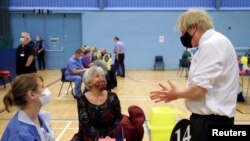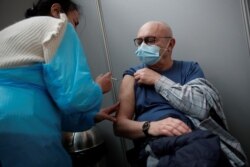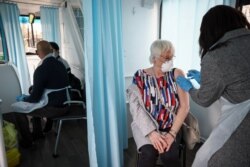The British government has approved the world’s first-ever test that will involve deliberately exposing volunteers to the novel coronavirus.
Under the so-called human challenge trial, up to 90 healthy volunteers between the ages of 18 and 30 will be exposed to the virus in “a safe and controlled environment” to allow researchers to study how it spreads and affects people, with the eventual goal of developing more effective vaccines and treatments.
The trials are scheduled to begin next month at London’s Royal Free Hospital.
Meanwhile, Japan began its long-awaited coronavirus vaccination program Wednesday.
The first shots took place at a Tokyo hospital just hours after it received the Pfizer-BioNTech vaccine. As many as 40,000 doctors and nurses across the nation will receive the first doses, with the eventual goal of inoculating 3.7 million medical personnel by March, followed by about 36 million citizens 65 years of age and older.
Japan’s vaccination program is off to a slow start, with health authorities only formally approving use of the two-dose Pfizer-BioNTech drug on Sunday. Officials asked Pfizer to carry out further tests on the vaccine in addition to earlier tests that had been conducted in other countries. Taro Kono, the country’s vaccine minister, told reporters Tuesday the additional testing was conducted to reassure the Japanese people of its safety.
Vaccinations are not compulsory in Japan, and while Kono voiced confidence he could reach front-line workers and elderly people, he acknowledged he needed to formulate a plan for successfully reaching younger people and encourage them to get the shot.
Along with Pfizer-BioNTech, Japan has signed contracts to procure millions of doses of the vaccine from AstraZeneca and Moderna, enough in all for 157 million people. The country is hoping to get enough people vaccinated in time for the postponed Tokyo Summer Olympic Games, which are scheduled to begin in July. Japan is the last member of the Group of Seven (G7) industrialized nations to begin the shots.
In South Africa, President Cyril Ramaphosa will join health care workers in receiving the first dose of a new vaccine developed by U.S. drugmaker Johnson & Johnson. About 80,000 doses arrived in Johannesburg late Tuesday, with a total of 500,000 doses expected to be shipped to South Africa within the next few weeks
South Africa had purchased 1 million doses of the two-shot vaccine developed by AstraZeneca and Oxford University, but abandoned plans to use the drug after a study revealed that the vaccine was less effective against a variant of the coronavirus recently discovered in the country. Health Minister Zweli Mkhize told parliament Wednesday that South Africa will share the AstraZeneca-Oxford vaccine with the African Union, which will distribute it throughout the continent.
The single-dose Johnson & Johnson vaccine has not been formally approved for use by any country, but the company says results of a late-stage clinical trial shows it is 85% effective in preventing serious illness or death from COVID-19, even against the South African variant. COVID-19 is the illness caused by the virus.
South Africa has also purchased another 20 million doses of the Pfizer-BioNTech vaccine.
In the United States, President Joe Biden said Tuesday night the country will have more than 600 million doses of coronavirus vaccines, enough to inoculate “every single American” by the end of this July. Biden made the pledge during a question-and-answer session in Milwaukee, Wisconsin that was televised on cable news network CNN.
When asked by moderator Anderson Cooper when the U.S. will return to normal, Biden said by next Christmas “we’ll be in a very different circumstance, God willing, than we are in today.” The White House announced earlier Tuesday that the federal government will increase the number of vaccines that states receive each week from 11 million doses to 13.5 million.
The president also said that states should prioritize public school teachers in their vaccination efforts as part of a strategy to reopen schools to full-time in-person classes.
As of Wednesday, there have been more than 109.5 million confirmed coronavirus infections worldwide, including 2.4 million deaths, according to the Johns Hopkins University’s Coronavirus Resource Center. The World Health Organization says the number of new confirmed cases declined by 16% last week to 2.7 million, while the number of new deaths was 81,000, a decline of 10%.








